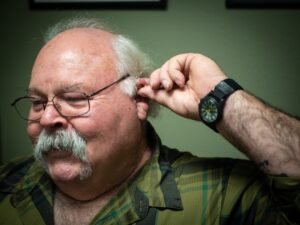
It can be difficult to live with hearing loss — it can directly affect your professional and personal life, both in the present and the foreseeable future. But did you know that if you served in the military and developed noise-induced hearing loss as a result of performing duties in a noisy environment, you may be able to receive essential assistance?
In this post, we will cover eligibility for compensation under the Armed Forces Compensation Scheme (AFCS) if you are deaf or have suffered hearing loss as a result of service in the UK armed forces.
Eligibility to Make a Claim with the Armed Forces Compensation Scheme (AFCS)
This scheme is intended to award compensation for anyone who is serving or has served in the UK armed forces from 6 April 2005*. All regular military service personnel and reserve troops for the British Army, Royal Air Force, Royal Navy and the Royal Gibraltar Regiment are all covered by the scheme.
You are eligible to apply whether you continue to serve in the armed forces, have received a military discharge or are retired. Any other personal accident insurance, such as life insurance (LI) or personal accident (PAX), is not taken into account when calculating your AFCS payout.
Regardless of fault, in a wide range of situations when illness, impairment or injury has occurred due to military service, making a claim under the Armed Forces Compensation Scheme will not restrict your rights to file a separate civil case if you believe negligence was to blame.
*You may be eligible for a War Pension Scheme (WPS) claim if you are no longer in the military and your disability was brought on by or aggravated by your military service prior to 6 April 2005.
Hearing loss comes under the definition of “late-onset illness” and can meet the criteria for compensation under any of the below definitions.
Definition of “late-onset illness”:
|
Claims for Medical Discharge from the HM Armed Forces
Your service records may be forwarded to Veterans UK if you are medically discharged by the armed forces. You will automatically have your eligibility determined under the scheme when any injury, medical condition or illness has been diagnosed as the primary cause of your medical discharge.
If you are not deemed eligible when your service is complete, you might be able to apply for a review of your entitlement to compensation under the Armed Forces Compensation Scheme. During this review, relevant evidence from various sources that are inside and outside the Ministry of Defence will be used in order to evaluate your claim.
If you recently received hospital treatment, a duplicate of your hospital’s medical records or supporting documents, such as reports from your medical officer, copies of orders and accident/incident reports can help make the assessment faster. Sometimes decisions can not be reached based solely on the most recent medical data; if this is the situation, you might be requested to attend a doctor’s appointment for a medical evaluation.
Claim Time Limits of Armed Forces Compensation Scheme
Claims for illness or injury must be filed within seven years from the earliest of the following dates:
- The date of the accident that caused or contributed to the illness or health condition
- The date an illness or injury that wasn’t brought on by service grew worse due to service duties
- The date the patient was first seen by a medical professional and the discharge date, in the instance of a medical condition as a result of an illness
There are several situations where a claim can still be accepted after the deadlines mentioned above, which include if you were unable to submit it because of illness or a medical condition that developed at a later date.
You do not require the services of a legal representative or claims management firm to apply for compensation. If you want further information or help to make a claim under the Armed Forces Compensation Scheme, please visit Armed Forces Compensation to file a claim. The Veterans Welfare Service can also be contacted for help and advice at the Veterans UK helpline: 0808 1914 218 (open 8 am to 4 pm, Monday to Friday).
To learn more about the next steps, find out what happens when you make a claim and view the customer claim journey for the Armed Forces Compensation Scheme, click here.
Download option: accessible file for the Armed Forces Compensation Scheme.
Types of Armed Forces Compensation Scheme Awards
Your amount of income or savings has no bearing on the validity of your claim, and all payments are tax-free.
The two primary AFCS award categories are:
- Lump-sum payments
- Guaranteed income payments
Armed Forces Compensation Scheme lump-sum payments
If your claim is approved, you can get a lump-sum payout which could be anywhere between £1,200 to £570,000. The amount you receive will vary based on how serious the impact of your illness, injury or disability has on your physical and/or mental health.
Armed Forces Compensation Scheme guaranteed income payments (GIPs)
A guaranteed income payment (GIP) is a monthly benefit that is tax-free and is awarded for severe, long-term impacts of illness, injury or disabilities. This can be based on the effects it has on your physical and/or mental health.
Receive assistance in British Sign Language (BSL)
Contact the deafPLUS Advice Line for assistance or advice regarding the Armed Forces Compensation scheme in British Sign Language (BSL).
At Regain Hearing, we want to make sure you get the help you need to take back control of your life if you have hearing loss or tinnitus. While we are not able to offer benefits advice, our experienced audiologists offer the most advanced hearing tests and lifetime aftercare.
Book an appointment today and let us help you find solutions for hearing loss at one of our Regain Hearing clinics in London and Kent.
